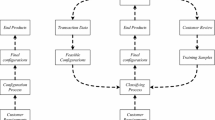Abstract
When applying CBR for Electronic Commerce, the adaptation capabilities of CBR can be used for product customization. Most adaptation techniques suffer from the problem that they require a large knowledge acquisition effort which leads to problems in the rapidly changing E-Commerce scenario. In this paper we present a new approach to adaptation that is particularly suited to Electronic Commerce applications. It assumes that products can be structured hierarchically into sub-components. Adaptation is achieved by incrementally replacing unsuitable sub-components through recursively applying CBR to find best-matching alternative sub-components. The presented approach avoids huge portions of the knowledge acquisition effort and is prototypically implemented as an extension of the CBR-Works tool.
Preview
Unable to display preview. Download preview PDF.
Similar content being viewed by others
References
R. Bergmann, S. Breen, M. Göker, M. Manago, and S. Wess. Developing Industrial Case-Based Reasoning Applications: The INRECA Methodology. State-of-the-Art-Survey, LNAI 1612. Springer Verlag, 1999.
R. Bergmann and A. Stahl. Similarity measures for object-oriented case representations. In B. Smyth and P. Cunningham, editors, Case-Based Reasoning Research and Development, volume 1488 of LNAI, pages 25–36. Springer, 1998.
R. Bergmann, W. Wilke, I. Vollrath, and S. Wess. Integrating general knowledge with object-oriented case representation and reasoning. In 4th German Workshop: Case-Based Reasoning-System Development and Evaluation 1996, 1996.
R. Burke. The wasabi personal shopper: A case-based recommender system. In 11th International Conference on Innovative Applications of Artificial Intelligence, 1999.
R. Cunis, A. Günther, and H. Strecker, editors. Das PLAKON-Buch. Number 266 in Informatik-Fachberichte. Springer, Berlin, 1991.
B. D. Netten and R. A. Vingerhoeds. Incremental adaptation for conceptual design in EADOCS. In European Conference on Artificial Intelligence (ECAI’98) Workshop on Adaptation in Case-Based Reasoning, 1996.
K. Pfitzner. Fallbasiertes Konfigurieren technischer Systeme. Dissertation, Universität Hamburg, 1993.
S. Schmitt and R. Bergmann. Product customization in an electronic commerce environment using adaptation operators. In 7th German Workshop on Case-Based Reasoning, 1999.
I. Watson and S. Perera. Context guided retrieval. In David B. Leake and Enric Plaza, editors, Case-Based Reasoning Research and Development, volume 1266 of Lecture Notes in Artificial Intelligence, pages 359–370. Springer, July 1997. International Conference on Case-Based Reasoning ICCBR-97.
W. Wilke. Knowledge Management for Intelligent Sales Support in Electronic Commerce. DISKI 213. Infix Verlag, 1999.
W. Wilke and R. Bergmann. Techniques and knowledge used for adaptation during case-based problem solving. In 11th International Conference on Industrial and Engineering Applications of Artificial Intelligence and Expert Systems IEA-98, 1998.
Author information
Authors and Affiliations
Editor information
Editors and Affiliations
Rights and permissions
Copyright information
© 2000 Springer-Verlag Berlin Heidelberg
About this paper
Cite this paper
Stahl, A., Bergmann, R. (2000). Applying Recursive CBR for the Customization of Structured Products in an Electronic Shop. In: Blanzieri, E., Portinale, L. (eds) Advances in Case-Based Reasoning. EWCBR 2000. Lecture Notes in Computer Science, vol 1898. Springer, Berlin, Heidelberg. https://doi.org/10.1007/3-540-44527-7_26
Download citation
DOI: https://doi.org/10.1007/3-540-44527-7_26
Published:
Publisher Name: Springer, Berlin, Heidelberg
Print ISBN: 978-3-540-67933-2
Online ISBN: 978-3-540-44527-2
eBook Packages: Springer Book Archive




